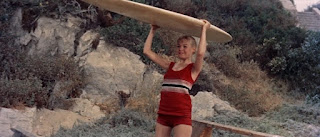A Lady of Chance was shot as a silent film. By this time audiences were losing interest in silent films so MGM added some dialogue scenes. That soundtrack is apparently lost so the movie now survives only as a silent movie. What we get on the DVD is a modern score - I turned the volume down to zero as quickly as possible. I’ll watch a silent movie with no sound at all rather than endure a modern score.
Dolly Morgan, nicknamed Angel Face (Norma Shearer), is a con artist. She’s working the old badger game. It’s a racket she knows well.
She has a prime sucker lined up. His name is Hammond. Hammond knows that Dolly isn’t exactly a respectable girl. That’s OK, he doesn’t want a respectable girl. He wants a bit of fun. He knows that girls like Dolly don’t give away their favours without getting a few presents in return. Of course he doesn’t know just how much his fun is going to cost him this time. It’s going to cost him ten grand (an immense amount of money in 1928). He’ll have to pay up because if his wife finds out he’s in big trouble. She is not a very understanding woman.
Dolly is working this racket on her own, but unluckily for her she runs into two former partners-in-crime, Brad (Lowell Sherman) and Gwen (Gwen Lee). They want a piece of the action. Of course they intend to double-cross Dolly and she intends to double-cross them. When it comes to double crosses Dolly is an expert. She ends up holding the ten grand but she will have to make a hasty departure.
Dolly has a new sucker lined up, Steve Crandall (Johnny Mack Brown). This could be it, the big score that every girl in Dolly’s line of work hopes will come along. Steve is a cement tycoon which sounds promising enough but when he tells her about the plantation back home, in the South, she knows she’s hit the jackpot. Ten grand is chicken feed compared to a score like this.
And the best thing is that Steve is as dumb as a rock. He even offers to marry her. She can’t wait to see that plantation. When she arrives in Steve’s home town there will of course be some surprises in store for her.
Dolly has been thrown for a loop and now the last thing she needs is for Brad and Gwen to turn up. Which of course they do.
While it’s not a conventional formulaic romantic comedy this is a movie that combines comedy with romance. It is amusing, and it is very romantic.
The acting is pretty good. Johnny Mack Brown makes Steve suitably innocent and naïve but he’s so well-meaning we can’t despise him.
Lowell Sherman and Gwen Lee are fun as likeable rogues. Gwen Lee in fact is a delight. Lowell Sherman’s reputation hasn’t stood the test of time which is perhaps a little unfair.
Norma Shearer is fine and she manages to sell us on Dolly’s sudden change of heart. It’s a brittle amusing performance. These four main players really work extremely well together. Norma Shearer looks fabulous, which is easy for an actress to do when she has the great Adrian designing her gowns.
Robert Z. Leonard is not a director you’ll find on most people’s great directors lists and he’s not one of the darlings of auteurist critics but he made some extraordinarily good and interesting movies, include the superb 1949 noir The Bribe and the very underrated pre-code Susan Lenox (Her Fall and Rise).
The Warner Archive DVD presentation is very good.
I haven’t seen a huge number of Norma Shearer’s films. I want to see more but her movies are remarkably difficult to find. I do highly recommend one of her earlier silent pictures, Lady of the Night (1925), in which she plays dual roles.




































.jpg)
.jpg)
.jpg)
.jpg)









